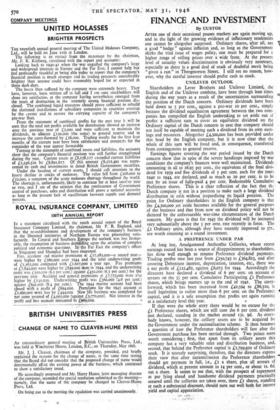FINANCE AND INVESTMENT
By CUSTOS
AFTER one of their occasional pauses markets are again moving up, and in the light of the growing evidence of inflationary tendencies one cannot be altogether surprised. Ordinary shares, after all, are a good " hedge " against inflation and, so long as the Government shirks the vital issue of wages policy, one must be prepared for a higher range of selling prices over a wide front. At the present level of security valus discrimination is obviously very necessary, especially as there is a good deal of stock of doubtful merit being "given a run" in Throgmorton Street. I still see no reason, how- ever, why the careful investor should prefer cash to stock.
•
4
■ IC
UNILEVER OUTLOOK ,
Shareholders m Lever Brothers and Unilever Limited, the English end of the Unilever combine, have been through lean times during the war years as a result of the uncertainties surrounding the position of the Dutch concern. Ordinary dividends have been held down to 5 per cent., against a pre-war to per cent., simply because the dividend equalisation agreement between the two com- panies has compelled the English undertaking to set aside out of ' profits a sufficient sum to cover an equiiralent dividend on the Ordinary capital of the Dutch concern in case that company should not itself be capable-of meeting such a dividend from its own earn- ings and resources. Altogether L4,3430,000 has been provided under this head by the English company, but it is now clear that the whole of this sum will be freed and, in consequence; transferred from-contingencies to general reserve.
Earnings figures covering the war period issued by the Dutch concern show that in spite of the severe handicaps imposed by war conditions the company's finances were well maintained. Dividends amounting in all to 26.95 per cent., the equivalent of the final divi- dend for 1939 and five dividends of 5 per cent. each for the years 1940 to 1944, are declared, and as much as 20 per cent. is to. be met by an issue of fully-paid 4 per cent. Redeemable Cumulative Preference shares. This is a clear reflection of the fact that the Dutch company is not in a position to make such a large dividend distribution in cash without jeopardising its liquid position. The point for Ordinary shareholders in the English company is that the £4,300,000 set aside becomes available for the general purposes of the business and that from now on dividend policy will not be dictated by the unfavourable war-time circumstances of the Dutch concein. My guess is that for 1945 the dividend will be increased very substantially above the 5 per cent. rate recently in force. The LI Ordinary units, although they have recently improved to 57s., are worth retaining as a sound investment.
A PREFERENCE UNDER PAR
At long last, Amalgamated Anthracite Collieries, whose recent earnings record has been a source of disappointment to shareholders, has done well enough to resume Preference dividend payments. Trading profits rose last year from £250,743 to £364,823, and after covering Debenture interest, depreciation, taxation, etc., there was a net profit of (122,482, against L6,073 for 1944. Accordingly, the directors have declared a dividend of 6 per cent, on account of arrears on the 31 per cent. Cumulative Participating Li Preference shares, which brings matters up to the end of 1941. The carry- forward, which has been increased from £42,594 to £86,310, is itself equivalent to rather more than 6 per cent. on the Preference capital, and it is a safe assumption that profits are again running at a satisfactory level this year.
If that were the whole story there would be no excuse for th.: Li Preference shares, which are still cum the 6 per cent, dividend just declared, standing in the market around 13s. 9d. As- every- body knows, however, the _collieryassets are to be acquired by the Government under the nationalisation scheme. It then becomes a question of how the Preference shareholders will fare after the Government purchase has been carried through. Two points seem worth considering ; first, that apart from its colliery assets this company has a very valuable sales and distribution business, and, second, that behind the Preference capital is L1,799,92o of Ordinary stock. It is scarcely surprising, therefore that the directors express their view that after nationalisation the Preference -shareholders should get payment in full, i.e., Li a share, plus all arrears of dividend, which at present amount to 14 per cent., or about Is. 64 net a share. It seems to me that, with the prospect of repayment at par lying ahead and handsome dividend payments practically assured until the collieries are taken over, these LI shares, standing at such a substantial -discount, should turn out well both for income yield and capital appreciation.






























 Previous page
Previous page